![]()
The Words of the Selig Family
|
|
The Words of the Selig Family |
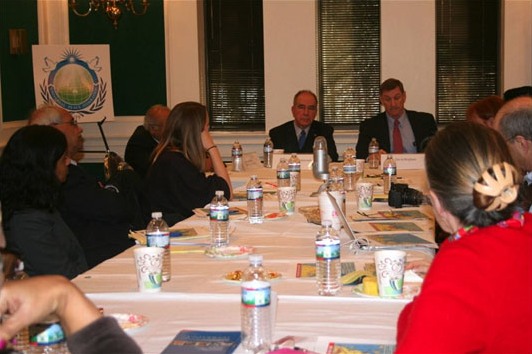
Since the time it gained independence in 1947, India has played an important role in promoting peace and the advancement of international law and principles in the world. Today, India stands as a major power in a multipolar world, with its geopolitical influence spanning from the Middle East to East Asia. In that light, the Feb. 19, 2014 UPF forum discussed some of the factors that favor India's role as a global facilitator for stability and confidence building between Russia, China, the U.S., the EU and the Middle East. The main points included: India's commitment to being a country of "strategic autonomy" as part of its "Indian State Identity"; India's unique culture and history as a founder of the Non-Aligned Movement (NAM); India's good working relationships with the world powers (U.S., EU, Russia, China); and India's status as an emerging power, along with Brazil, Russia, China and South Africa (BRICS).
In his welcoming remarks, Dr. Antonio Betancourt, director of the Office of Peace and Security Affairs, said, "As the world watches China's efforts to expand its influence in the South China Sea and the East China Sea, India has its eye on the Indian Ocean and ways to expand its strategic footprint. Concerned about Beijing's possible constraints on freedom of navigation, India is taking steps to strengthen ties with island nations, including the Maldives, Sri Lanka, Mauritius, and Seychelles."
"Unlike Russia, China and most of the Middle East," Dr. Betancourt added, "India has more than 60 years of a working democracy, and it has been able to continue building a system of government that is uniquely Indian in outlook and yet compatible with the world's working democracies."
The moderator for the afternoon forum was Colonel David Brigham USA, Military Fellow, International Security Program, Center for Strategic and International Studies (CSIS). Col. Brigham served in command and staff assignments throughout his 24-year career, including postings in Germany, Korea, Bosnia, Tajikistan, Pakistan, and Afghanistan.
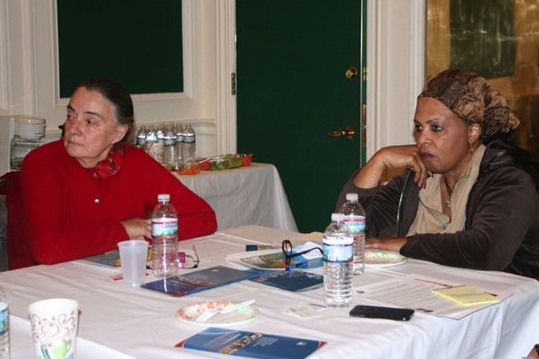
Col. Brigham raised the question of whether India should play a role as facilitator for stability and confidence builder among the major powers of the world. The general consensus among participants was in the affirmative. However, some said that although India may be ready to be a facilitator, she may not know it or may not wish to assume this role. Perhaps someone needs to tell India to play a bigger role and, if necessary, explain the many reasons to justify its role as facilitator.
H.E. Subhas Chandra Mungra, Ambassador of Suriname, stated: "India is destined to be a global player from both economic and political points of view." He called attention to some of the similarities between the development of India and that of Brazil, which impacts his nation of Suriname and Latin America in general. He observed that diplomats need to follow such similarities closely and learn about their geopolitical effects. He expects to see India continue its development, particularly because of its role in technological advancements.
From the perspective of culture, experts point to India as the "mother of all cultures." The roots of most languages can be traced back to this part of the world, as well as the roots of most religions and even architecture. Thus, India has the pedigree. In addition, currently its most significant attribute is the size of its population, 1.1 billion people. If we look at China, for example, she is powerful not just because it has embedded its economy into that of the entire world, but also because of its huge population. Some have predicted that about 30 years from now, India's population will exceed that of China, given the effect of China's one-child policy.
Amb. Mungra commented that India has the "ingredients" to play a major role in producing world peace. For example, India has not engaged in territorial expansion or invading its neighbors. Secondly, India has a huge sense of tolerance and respect for cultural diversity. Thirdly, India has promoted a high regard for nature and the environment. Many of the historical principles that have guided India can be found in its Vedic scriptures, which go back almost 2,000 years before the time of Christ. The ambassador said that these moral principles are the foundation for India's foreign policy, namely, "respect the human being, respect the culture of another, respect your neighbor, respect other religions, and respect the surrounding nations."
Col. Brigham then asked, "Is India ready to play a role as America's partner, and if so, what type of role?" Participants generally agreed that America is looking for allies and partners in that region of the world. India's role would be to help maintain the peace and deal with various emerging issues, including terrorism, drug trafficking, climate change, trade, piracy, and so on.
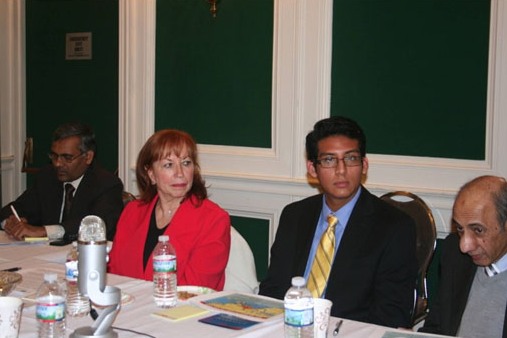
Dr. Betancourt proposed some out-of-the-box ideas in addressing the question, "What should the U.S. role be or not be in helping India fulfill the task of a facilitator?" He said that we don't need India to be a military ally that follows the U.S. He observed, "That way of dealing with world problems is exhausted. It has only led us to more wars." Instead, he suggested that America should tap into India's long and unique history of diplomacy, which successfully honors strategic autonomy as part of India's national identity. He said, "India has had a working democracy for almost 70 years, unlike Russia and China. It follows that India has something to show the countries of the region, not as an ally of the U.S. but as an ally of the principles that are in line with India as a peace-loving country."
It was acknowledged that India has domestic issues to deal with. Yet, as Dr. Betancourt pointed out, "Whether they like it or not, they are part of this boat called planet Earth." Nearly twenty percent of the world's population is in that country, making it an important part of the destiny of the world. It should play a role that is equal to its size and the world's expectations of it as a global power.
Nilanthi Samaranayake from the Center for Naval Analyses, who has written extensively on Indian affairs, believes India should consider expanding the size of its diplomatic corps. She said, "India has a population of over 1 billion people, but its diplomatic corps is the same size as Singapore. India has high quality diplomats, but it should increase the [size of its] diplomatic corps and put more resources behind and cultivate this group of leaders."
Some participants cautioned that India should not be expected to become a "policeman" of the area, because that would go against India's unique nature. Rather, emphasis should be placed on India's role as a peacemaker and facilitator.
Dr. Dadachanji pointed out that the U.S. and Indian naval forces have been conducting joint exercises in the Indian Ocean. Nilanthi Samaranayake, who has written on that topic, briefed the group about the bilateral exercises, which began in the 1990s. The largest of these is the Malabar exercise, which has become an annual event. These joint exercises have been successful in bringing the two nations and their navies closer, as well as in maintaining security in the Indian Ocean. With U.S. defense budgets declining, the U.S. is increasingly looking toward its friends and allies.
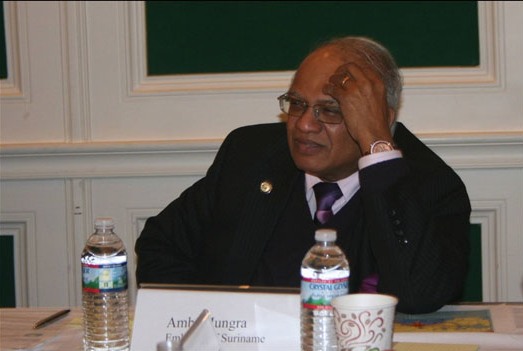
Paula Kipperman, COO of United World Technologies, strongly emphasized the need for free trade between the U.S. and India and India's neighbors as an important means to promote peace while also raising the standard of living. She gave the example of the implementation of "micro credits" in India. There are many success stories of Indian women receiving a $200 microloan, enabling them to purchase a sewing machine, which then allows them to transform their economic well-being.
Dr. Dadachanji noted that there are also some tensions in the region. In particular, there are tensions between India and Pakistan, for religious and political reasons. In addition, there have been border disputes between India and China. He reminded the panel that during the Cold War, India positioned itself as a pro-Soviet "nonaligned nation."
Dr. Betancourt said: "The world is changing because humankind is changing. UPF is actively advocating a culture of peace through inter-religious dialogue and cooperation. We live in a global family, and nations need to relate to one another almost like older and younger brothers and sisters. As in a family, each nation has a role to play."
That was one of the prime arguments for India's role as a facilitator and confidence builder. In other words, India has been a democracy for almost 70 years, and it has a history of more than 5,000 years. India therefore has a role to show how peace can be achieved in the family of nations. The people of the region need to work together for the benefit of all.
One participant said, "If they're not taking that role effectively, then they should be gently encouraged and shown that it is in their interest to step forward and live up to their responsibilities."
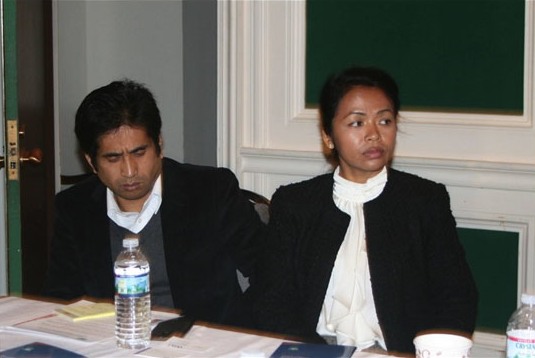
Summarizing the issue, Amb. Mungra said, "We are not living in a jungle. In a civilized society you are born with responsibility. As you grow up, your power increases. You have to assume more responsibility within the family, streets, community, and nation. Countries like India and Brazil must take global responsibility for climate change, human rights, terrorism…. India cannot turn its back on the region and the world."
Most participants agreed India has a moral obligation to take on greater responsibility, play a bigger role, and be a good partner for the United States, joining in the fight against terrorism and other common world problems.
It was suggested that in taking on the role of facilitator, India could employ "backdoor diplomacy" -- that is, diplomacy that is conducted quietly and out of the spotlight. That way, it would not be seen as a meddler. In addition, Dr. Ann Marie Look and some of the other participants recommended that more women be involved. Dr. Look noted that women have an interesting perspective on how to deal with conflicts. She said, "We negotiate in a different way. We are not warriors. We are consolidators." Indian women, it was noted, are at the forefront in many fields: technology, science, politics, and economics.
As the discussions came to a close, Secretary Verma (from the Embassy of India) expressed his appreciation to the host, moderator, and participants for an interesting and informative session.
In conclusion, we recognize that there is only one world that we share and our time on the planet is temporary. We all want durable, sustainable peace, and there are many challenges and issues that need to be resolved and responsibilities shared. Considering India's unique history, philosophical outlook, size, and economic growth, it is well suited to play a major role as a facilitator for stability and peaceful relationships between the major powers of the world.
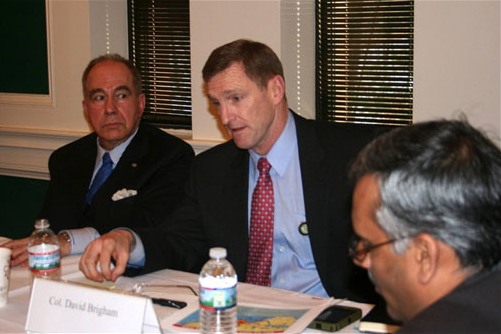
Host:
Dr. Antonio Betancourt -- Director, UPF Office of Peace and Security Affairs, Washington, DC
Moderator:
Col. David Brigham, USA -- Military Fellow, International Security Program, Center for Strategic and International Studies (CSIS)
Attendees:
Ms. Ashlyn Anderson, Research Associate, South Asia, Council on Foreign Relations
Mr. Hari Bindal, President, American Society of Engineers of Indian Origin
Dr. Dinshaw Dadachanji, Science Editor, New World Encyclopedia
Prof. Diane Falk, Research Writer and Editor
Mr. Pablo Guerrero, IT Support, United World Technologies
Mr. Lester Johnson, Founder/Owner, Washington Avenue International, LLC
Ms. Paula Kipperman, COO, United World Technologies, LLC
Dr. Ann Marie Look, President, We Can Education and Development Strategies Foundation
H.E. Subhas Chandra Mungra, Ambassador, Republic of Suriname
Mrs. Velotiana Raobelina, Charge d'affaires, Embassy of Madagascar
Ms. Nilanthi Samaranayake, Research Analyst, Center for Naval Analyses, Strategic Studies / International Affairs Group
Mr. Manoj B. Verma, Second Secretary, Embassy of India
Bishop Nancy Womble, Clergy
Dr. William Selig, Deputy Director, UPF Office of Peace and Security Affairs, Washington, DC
Dr. Mark P. Barry, Advisor, UPF Office of Peace and Security Affairs (Observer)
We thank Dr. Dinshaw Dadachanji for his valuable assistance in preparing this report.